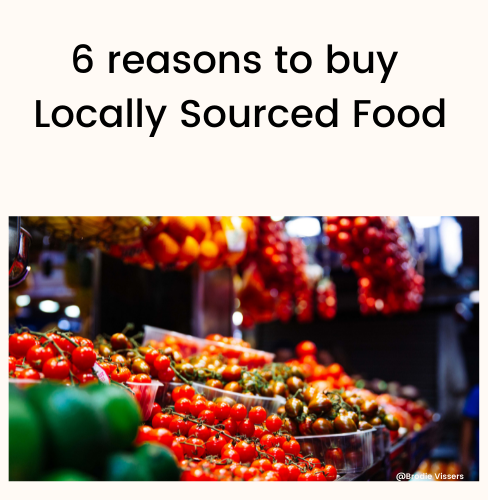The longer it takes for food to travel from farm to plate, the higher its climate footprint— the principal reason why eating locally grown food is better for the environment. A shorter distance decreases the amount of emission released and energy resources used for food transportation, storage, and distribution.
Table of Contents
Today, thanks to the global food supply chain, food is attainable from all over the world. But it is worth noting that food miles harm product quality (esp. fresh foods) as well as the ecosystem. To say, food transported by air emits 177 times more GHGs than the same volume transported by sea. This isn't to say there aren't instances where things are more complicated. Sometimes, it can be more than simply perceiving the distance between farm and plate as the testimony of an unsustainable food system. While the primary focus is often on natural resource utilization and impacts on ecosystems, research reveals certain imported items may have lesser footprints than domestically sourced items. Australia, for instance, gets about 72% of its seafood consumption from overseas. Interestingly, the carbon footprint difference between imported and domestic is comparable.
Buying organic and local foods is an effective way to put our words into action. GHGs emissions are at an all-time high, resulting in an increased temperature and possible disastrous impacts. We must comply with our measures to facilitate a low-carbon economy to change this situation. And, redirecting our eating habits to clean, locally sourced food is among the measures.
According to estimates, a carbon footprint of 2.03 tonnes per year per person by 2030 is necessary to sustain the 1.5C threshold of global warming. Currently, the average carbon footprint per person in the United States is around 13.68 tonnes— roughly a deficit of about 11 tonnes to reach the target. Consuming locally sourced food may not be the perfect, faultless solution, but it is a powerful tool to curb emissions and lower global warming.
Here are other six reasons why consuming local food is beneficial:
Higher nutrient levels
Locally sourced food is both delicious and nutritious. The plant cells begin to shrink from the moment a fresh vegetable or fruit is picked, which diminishes the nutrients. This means the longer time passes after picking, the fewer nutrients they retain. Local produce is cultivated and handled for its nutrient properties rather than storage period. It doesn't travel vast distances or spend time in distribution channels before touching down at the markets (unlike supermarket produce). This provides us with bright, crispy, flavorful food, ensuring the highest nutritional value offerings.
Supports Physiological Processes
Consuming local produce implies eating foods growing in alignment with the season. The natural cycle of produce provides human health with everything we require, which aids in the natural physiological processes. For example, the bountiful leafy greens during the spring help the body system detox the heavier winter foods. Summer, on the other hand, offers juicy fruits that keep the body hydrated.
Better food quality
Food grown close to home tastes better because it experiences a lower rate of moisture and nutrient loss and spoilage. The quality of most local produce at farmers' markets is not constrained by picking, packing, or long-distance transportation— it retains maximum freshness, resulting in the highest levels of nutrition, crunch, and flavor. This food is nurtured for flavor rather than being chemically treated to endure the perilous supply process.
Flourishes the environment
Experts estimate that fresh food items make a journey of about 1,500 miles between the source and destination. If we think about it, that is a monumental volume of carbon footprint for a handful of chilly or a basket of potatoes. Purchasing locally grown food sources excludes gas-guzzling transport systems and reduces the food's eco-impact.
Uplifting communities
Buying produce from a local farmer is investing in the community— supporting local producers and creating income opportunities. Supporting local farmers is critical for tomorrow's food and nutrition security, especially in light of the current unpredictable economy and prevailing dependency on fossil fuels to harvest, pack, ship, and preserve food. Buying and eating local food helps build a future with a safer and healthier food supply chain and a wealthier demographic.
The organic benefit
Food produced closer to home allows consumers to have a stronger bearing over the food, which lacks in supermarket purchases. First-hand traffic with produce sold at local markets gives the shopper a clearer insight into the item quality and standards of the item— is it organic? Was it picked under 24 hours? Meanwhile, farmers who sell organic produce want to offer the best quality to the buyers they associate with, ensuring it's worth the extra dollars. Organic indicates teaming up with nature– it entails improved animal welfare, less or no nitrogen-based fertilizers, and responsible land management. All of which promote biodiversity. However, mind that while local farmers may use organic methods to grow the food, it doesn't mean that the food is certified organic. So, if you're particular about the label, you want to directly ask the vendor about the certification (to make sure you purchase what you're looking for). If buying locally sourced organic food is not an option, you can always refer to the EWG's list of clean 15 and dirty dozen. This year, avocado is at the top spot of the clean 15, and strawberry at the dirty dozen. Check out the complete list of 2022 EWG's Dirty Dozen And Clean Fifteen.
Related blogs:
5 Tips To Reduce Food Waste At Home
Major Environmental Benefits of Veganism





